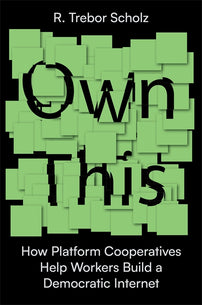A Platform of Fear
R. Trebor Scholz proposes worker self-management and ownership as an antidote to digital labour practices such as Uber’s ‘deactivation’ of drivers.

Derick Ongansie, a former Uber driver turned labor activist, greeted me at Cape Town International Airport a few years ago. In his late fifties, Ongansie had a strong voice, a thick beard, and a denim shirt, giving him a unique no-nonsense appearance. He told me about the predicament of Uber drivers in South Africa, the majority of whom are foreign African migrants, who regard the company as a “platform of fear.” Since being “deactivated” (fired) is permanent in South Africa, it is a continuous source of concern.
Ongansie offered me some background. The Uber Drivers Guild was established in April 2016 by a group of South African Uber drivers, which he led. At the time, 2,000 of the 10,000 registered drivers in South Africa had joined. The Guild sued the ride-hailing firm, claiming employee status for the taxi drivers, with the assistance of a team of lawyers. The defecting cabbies also enlisted the help of a public union, and the two groups worked together to win the case. The drivers won their suit in the first instance, but then lost on appeal. Unfortunately, since Uber has such deep coffers, it was able to hire additional attorneys to prolong the legal battle, which the union could no longer afford. Around that time, Ongansie contacted me, asking for my assistance in forming a cooperative, tentatively named CabNet Technology. Through his work with the Uber Drivers Guild in Cape Town, Ongansie recognized that the kind of funding and effort expended on strikes and lawsuits could have potentially been used by the drivers to establish their own ventures. They could change the system through worker self-management and ownership.
Wages for drivers like Ongansie had always been meager, but recently, with COVID-19, business had suddenly dropped, putting their livelihoods in jeopardy. With the pandemic, more activities such as remote work, learning, and basic human interaction were moving to digital platforms. And it was all correlated with the numbers in the bank accounts of Silicon Valley executives, particularly those in charge of platforms that do not rely on human contact.
Worldwide, at least 40 million individuals have, at least once, worked and earned money through apps. Workers who find “gigs” in this manner are predominantly migrants and other marginalized individuals. Beyond the couriers and taxi drivers, there are people cleaning apartments, caring for elders, or laboring along the global tech supply chains. Already before the pandemic, digital platform companies heavily relied on such low-paid labor. They depend on minorities, migrants, and other individuals who face disadvantages in their societies because of caste, poverty, disability, gender, or race. Often, these workers remain out of sight.
And it is not only that these workers are disproportionately more at risk (they are). They also experience an even more extreme lack of workplace democracy than people in the analog workplace, where they at least have the opportunity to directly interact with their bosses. The cultural critic Raymond Williams argued that liberal democracy suffered from a peculiar blind spot that valued “educated and participatory democracy” at the national constitutional level while rarely translating that into institutional norms and templates. As Williams observed, the twentieth century saw a wave of countries embracing democracy as their preferred political model. And yet the system in which most people spend the majority of their time—the world of work—is run according to a different set of rules.
Here, they have to spend their lives in servitude to a boss, in a form of subordination that dictates to them when they may go to the bathroom, what clothes they must wear, and how they should behave when they encounter an unpleasant customer. It is called having a job. This kind of subordination was exacerbated by Taylorism, a scientific management approach to increase efficiency and productivity, involving the development of a technique of surveillance in which the manager would control every movement a worker makes. Today’s methods of workplace surveillance are far more invasive than those of the early twentieth century— let’s say in Amazon’s warehouses, where a worker’s location is known at all times.
What is so surprising about this kind of management is that it is understood as common sense. Young people are told that they have to ready themselves for the job market, and gaining employment becomes one of the highest goals in life. What if, instead, people could express themselves, driven by self-guided energy and inventiveness? It is worth pondering how to change a system based on the domination of others, which is an attack on human dignity.
— An edited excerpt from Own This!: How Platform Cooperatives Help Workers Build a Democratic Internet by R. Trebor Scholz.
[book-strip]
